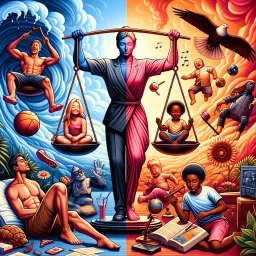”What’s the matter with you? Is this how you turned
out? A Hollywood finocchio that cries like a woman?“

- Meaning
- The phrase implies a strong societal expectation regarding masculinity, suggesting that expressing vulnerability, as indicated by crying, is a weakness. It reflects historical attitudes toward gender roles, where emotional expression in men is often stigmatized. This creates tension between personal emotions and societal expectations, revealing deeper psychological complexities about identity and self-worth.
- Allegory
- The allegorical image features a silhouette of a man embodying resilience while highlighting his internal struggle, indicated by the stormy sky. The shift to a brighter horizon signifies hope and acceptance of vulnerability. The tears transforming into flowers symbolize the beauty and strength found in emotional honesty, illustrating that embracing one’s feelings can lead to personal growth.
- Applicability
- In daily life, this phrase serves as a cautionary reminder about societal pressures surrounding masculinity. It encourages individuals to engage in conversations about emotional health and the consequences of repressing feelings because of fear of judgment from peers or society.
- Impact
- This phrase has had a notable impact on conversations surrounding masculinity, exemplifying the struggle many men face with emotional expression. It's often quoted in discussions about masculinity in popular culture and may inspire conversations regarding the evolution of gender roles.
- Historical Context
- The phrase originates from the early 1970s, during a time when traditional gender roles were being scrutinized, yet many still held onto rigid perceptions of masculinity. The depiction of characters in 'The Godfather' reflects cultural attitudes of the time regarding power and vulnerability.
- Criticisms
- Criticism has been directed at the phrase for perpetuating toxic masculinity, suggesting that vulnerability is a flaw rather than a human emotion. Arguments against this sentiment highlight the importance of emotional expression as a component of mental health, arguing that the ability to show emotions is a strength rather than a weakness.
- Variations
- Variations of this phrase exist in various cultures, often denoting the value placed on emotional restraint in men. Some cultures may interpret emotional expression as a sign of strength, while others reinforce the idea of remaining stoic. There can be significant differences in how vulnerability is perceived across cultures, with some celebrating emotional honesty more than others.
-

I believe in America. America has made my fortune.
-

You come into my house on the day my daughter is to be married and you ask me to do murder, for money.
-

Michael, we're bigger than U.S. Steel.
-

Women and children can be careless, but not men.
-

Fredo, you’re my older brother and I love you. But don’t ever take sides with anyone against the family again.
-

Some day, and that day may never come, I will call upon you to do a service for me.
-

I spent my whole life trying not to be careless. Women and children can afford to be careless, but not men.
-

I want you to use all your powers and all your skills. I don't want his mother to see him this way.
-

I trust these men with my life, Senator. To ask them to leave would be an insult.
-

I have a sentimental weakness for my children, and I spoil them, as you can see.
-

I know it was you, Fredo. You broke my heart.
-

Don’t ever take sides with anyone against the family.
No Comments